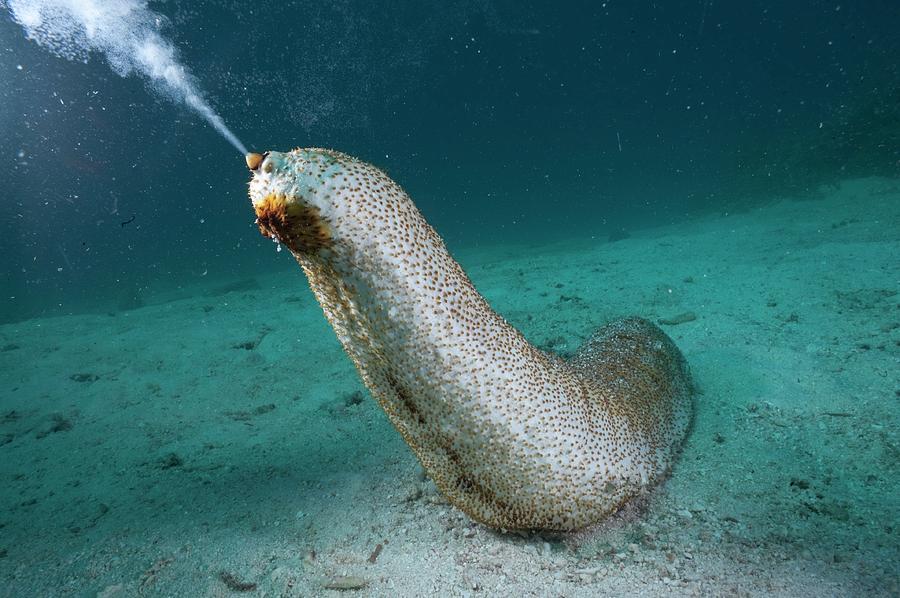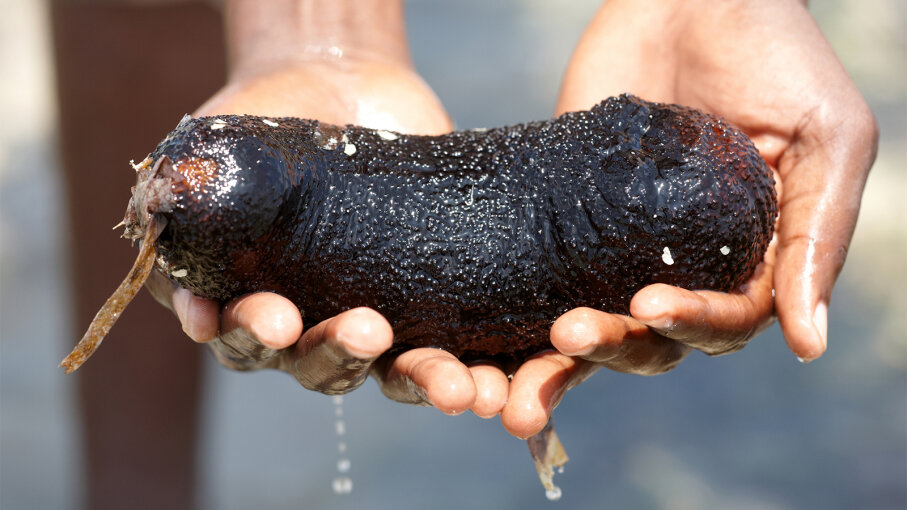Feature:
Sea cucumbers pinch out '5 Eiffel Towers worth' of poop per reef, per year
"Sea cucumbers — those chubby tubes of flesh that scooch around the ocean floor — have a very special talent: The tubular creatures are elite poopers, collectively expelling more than 70,000 tons (64,000 metric tons) of sandy poop out of their bottoms each year.
That's not an estimate for the entire globe; that's how much sea cucumbers poop on a single coral reef, per year. And even that tremendous number may be an underestimate, according to a new study...
...scientists studied sea cucumbers living on Heron Island Reef, a 7.3-square-mile (19 square km)...located at the southern end of Australia's Great Barrier Reef. The team used drones to collect video footage around the edge of the lagoon, in shallow areas of the reef known as flats, & then counted the sea cucumbers caught on camera.
From these samples, they extrapolated that more than 3 million cucumbers live across all the reef flats of Heron Island.
... the team ran feeding experiments with the most abundant of the cucumber species, the black sea cucumber or lollyfish (Holothuria atra). They found that a single sea cucumber defecates about 1.3 ounces (38 gm) of poop per day, & would therefore produce about 30.8 pounds (14 kg) of poop per year.
So altogether, the army of 3 million squidgy sea cucumbers living on Heron Island reef produce 10s of thousands of tons of poop each year, slightly more than the mass of five Eiffel Towers...
Even 'this was a huge underestimate of poop, because we didn't include the reef lagoon,' study author Vincent Raoult, a marine ecologist at the University of Newcastle, said in a tweet. 'Imagine on a global scale' just how much poop sea cucumbers dump into their local ecosystems, he added.
Why should we care about sea cucumber poop? Their droppings are critical to the health of ocean ecosystems, particularly coral reefs.
Like underwater earthworms, sea cucumbers gobble up organic matter on the ocean floor, including tiny pieces of algae & marine creatures...The digestion process breaks down this matter, releasing beneficial byproducts that get pooped out along with any indigestible sand that the cucumbers consume.
These byproducts include calcium carbonate, a key ingredient in coral formation, & ammonia, which acts as a fertilizer & promotes coral growth. Sea cucumber poop is also slightly basic, meaning it lowers the acidity of the surrounding water; less acidic conditions also help coral form their calcium carbonate skeletons...
'Sea cucumbers turn over sediment, which can aerate the sediment & release nutrients (food) to other organisms on coral reefs,' study author Jane Williamson, a marine ecologist & fisheries biologist at Macquarie University in Sydney, told Live Science... If sea cucumbers didn't swallow & poop out the sediment, 'these nutrients remain trapped & useless to other animals & plants.'
Despite their important role in reef ecosystems, overfishing threatens sea cucumber populations worldwide. Currently, 7 species are endangered & 9 are 'vulnerable to extinction,' according to a statement from the University of Newcastle. 'The reduction in density means that less sediment is turned over,' Williamson said. In other words, fewer sea cucumbers mean less sea cucumber poop, which poses a potential threat to coral reefs.
In sharing their new research, the team has found that 'people love the idea that poop is important,' Williamson noted. 'Everyone poops, so I guess it's something that people can relate to?' she said. "
Nicoletta Lanese
livescience.com
Feb. 5/2021









No comments:
Post a Comment